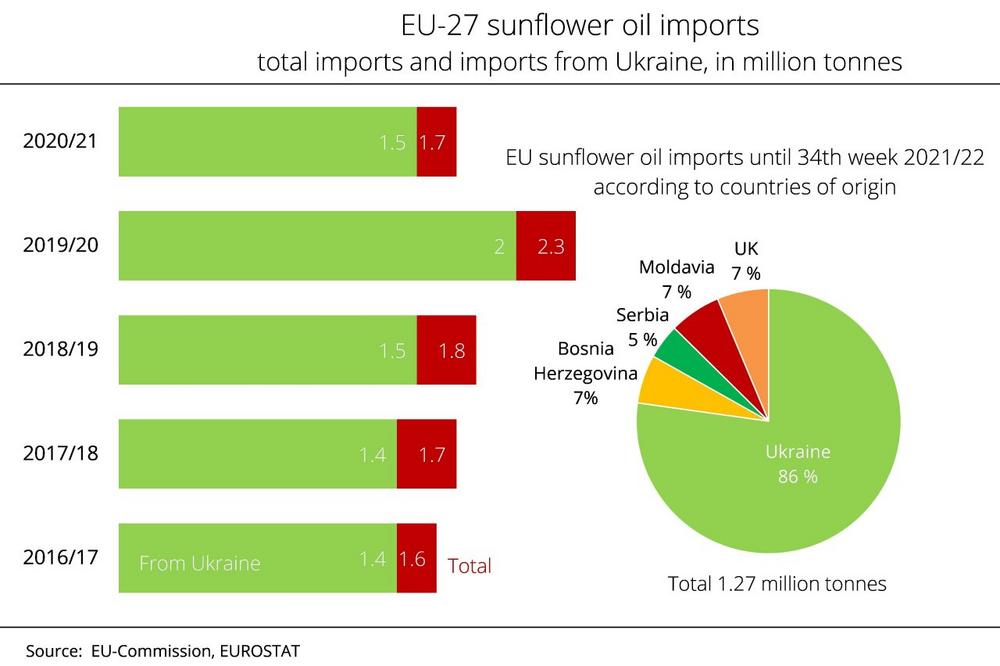In view of the war in Eastern Europe and the absence of shipments from the Black Sea region, the implications for the supply situation within the EU-27 are becoming increasingly clearer. Ukraine is the largest supplier of sunflower oil to the European Union. According to investigations conducted by Agrarmarkt Informations-Gesellschaft (mbH), imports in the crop year 2020/21 totalled around 1.7 million tonnes, of which 1.5 million tonnes, around 88 per cent, came from Ukraine. Although the Ukraine’s share in EU imports was lower in the 2019/20 season, the country supplied 2 million tonnes more then than it did in the past season.
In the current crop year, the EU-27 imported a total of around 1.27 million tonnes of sunflower oil until the end of February. About 1.09 million tonnes came from Ukraine, which translates to a market share of 86 per cent. Ukraine was followed by Moldova, Bosnia and Herzegovina and the UK with a 7 per cent market share each. The Union zur Förderung von Oel- und Proteinpflanzen e. V. has pointed out that if imports from Ukraine were to stop completely and in the medium term due to the export freeze, the European Union would face a serious supply problem.
Against this background, the UFOP has welcomed the announcements following last week’s informal Agriculture Council: On the one hand, consideration is to be given to allowing the cultivation of protein crops on set-aside land. On the other hand, the "Farm to Fork" strategy is also to be reviewed with a view to its impact on the EU’s security of supply. After all, the security of supply of agricultural feedstock starts in the field. Consequently, the "Farm to Fork" strategy should be geared to sustainable intensification instead of extensification of agricultural production. The association expects that farmers will adjust their summer crop sowing schedules, should additional land be released for crop production. At the same time, the UFOP has warned against unreasonably high expectations from such production, because crop rotation and suitability for cultivation involve tight constraints.
In view of collapsing supply chains, the UFOP has generally urged that agricultural policy place a stronger focus on the resilience of these chains. However, stakeholders of agriculture themselves are challenged to provide meaning to the term supply chain in the sense of fulfilling a binding function as contributors to the "Farm to Fork" strategy, for example by offering production and delivery contracts at an early stage. UFOP has called for soothing any unfounded supply fears of the public, which fears have also been triggered by significant increases in consumer prices. According to the association, there is no risk of supply bottlenecks like those seen at the beginning of the pandemic.
The UFOP has suggested that policymakers, together with representatives from the agricultural industry, take stock of the supply situation and, in this context, also properly assess the price increases in the food trade. The association believes that the increases are mainly due to the massive surge in energy prices. Further increases in energy prices must be expected in the coming years due to the continuing rise in carbon pricing. These prospects should be clearly communicated to consumers.
The Union for the Promotion of Oil and Protein Plants e. V. (UFOP) represents the political interests of companies, associations and institutions involved in the production, processing and marketing of domestic oil and protein plants in national and international bodies. UFOP supports research to optimise agricultural production and for the development of new recycling opportunities in the food, non-food and feed sectors. UFOP public relations aim to promote the marketing of domestic oil and protein plant end products.
UFOP – Union zur Förderung von Oel- und Proteinpflanzen e.V.
Claire-Waldoff-Str. 7
10117 Berlin
Telefon: +49 (30) 2359799-40
Telefax: +49 (30) 2359799-99
http://www.ufop.de
Telefon: +49 (30) 31904-225
E-Mail: s.arens@ufop.de
![]()
